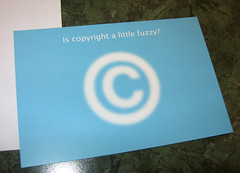 Image via Wikipedia
Image via Wikipedia
You can decrease your cost per song by registering multiple
songs at once as a collection, paying a single fee for the entire lot. For example, the title of your collection might be "Collection of Songs From Tennessee: 1. I Love You Dearly, 2. Baby, Don't Leave Me, 3. I Hate You For Leaving,"where the collection's title is arbitrary and followed by the tiltes of each song you want to register. The
Copyright Office recently announced its intention to charge a fee of $1 per title for electronic claims and $3 per title for paper claims listing titles of individual works in song collections. This isn't simply price grouping on the part of the Copyright Office; the additional fees help pay for keeping track of individual songs in a collection so they will show up in a database search. That way, someone won't have to know a song collection's provisional title in order to locate an included song's
copyright owner. Current copyright fees are listed at www.copyright.gov/docs.
MasterWriter (www.masterwriter.com) offers its Web-based Songuard service as an alternative means of protecting your songs at greatly reduced cost. When you buy MasterWriter
software, which is an outstanding songwriting application (see the review in the April 2004 issue at emusician.com), you get a free one-year subscription to the Songuard service; the fee for the service is $30 annually after the first year. Songuard registers and stores the date of creation of your song's melody and lyrics on the company's server. That's useful in protecting a song in it's development stage. Once the song is published, however, there are important benefits to registering it with the Copyright Office, including the right to be re-imbursed for attorneys' fees in a successful
copyright-infringement proceeding.
Songs that were previously registered with the Copyright Office when they were unpublished need not be registered again after publication. However, you will need to deposit two complete phonrecords of the published
sound recording's "best edition," along with any phonorecord packaging, with the Copyright Office. (Go to www.copyright.gove for more information.) If this isn't done withinh theree months of publication, you'll be levied a hefty fine. It's a silly, antiquated requirement, but it's the law. Songs available only as
internet downloads are currently exempt from this requirement.
To run a smooth operation, you'll need to maintain a modest inventory for your company. Obviously, you'll need
business letterhead and either custom mailing labels or preprinted mailers that include your company's logo and address. For making copies of your song demos, you'll need blank
CDs with printable surfaces and a
color printer that can print directly on CDs. The printer will likely come with software you can use to develop a template file for printing song titles and contact information on your CDs and importing your company's logo as a background graphic. Don't use CD labels--if they are applied out-of-round to your CDs, the disc won't play on some players. Buy extra ink tanks or cartridges before you run out. And keep a good supply of slimline CD cases or clamshells on hand for securing your CDs inside mailers.
Print several lyric sheets for each song in your catalog so you'll always have them on hand for urgent mailings. Lyrics should also be stored in electronic form so you can quickly paste them into emails when sending MP3's to industry contacts.
We will discuss the topic of Demo Production tomorrow...
I am overwhelmed by the amount of emails coming in from all of regarding this series. If there is a topic in the music industry you want to further discuss, please continue to feed us the topics. We will review them and discuss them based on your demands.
 Image via Wikipedia
Image via Wikipedia






